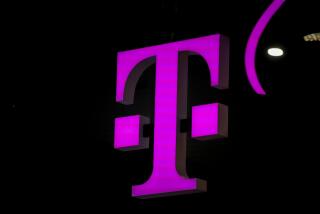Verizon posts higher net income
Verizon Communications Inc. reported second-quarter earnings Monday that satisfied analyst expectations and said its wireless arm would buy a rural cellphone carrier to expand its reach.
Investors found reasons to dislike the news, and shares of the country’s second-largest telecommunications company dropped 49 cents, or 1.2%, to $41.51, even as the broader market rebounded from last week’s losses.
Verizon Wireless said it had agreed to buy Rural Cellular Corp., which provides cellphone service in 15 states under the Unicel brand, for $757 million, or $45 a share.
That’s a stiff premium over Rural Cellular’s closing price Friday of $31.81, but the stock hit a high of $46.34 in early July, fueled by acquisition speculation.
On Monday, the stock soared $10.95 to $42.76.
Alexandria, Minn.-based Rural Cellular has 716,000 subscribers. Most of its network is incompatible with Verizon Wireless’ but compatible with AT&T; and T-Mobile phones.
Verizon Wireless said that it planned to move Rural Cellular’s subscribers over to phones compatible with its network but that it would maintain the older network for roaming by subscribers of other carriers.
Verizon is taking on about $1.9 billion in debt along with the acquisition but said it expected the deal to save it $1 billion in roaming fees and operations expenses.
Telecom analyst Thomas Watts at Cowen & Co. attributed the weakness in Verizon’s stock price Monday to traders selling shares of the acquirer and buying shares of the target company, a common strategy.
Overall, Watts said, he came away with “a positive feeling in the quarter,” and sees the company continuing to boost its earnings.
Verizon earned $1.68 billion, or 58 cents a share, from April through June, up from $1.61 billion, or 55 cents, during the same period last year. The per-share figure matched the average forecast of analysts polled by Thomson Financial.
Last year’s per-share figure included earnings from a number of businesses that have since been sold or spun off, including the high-margin directories publisher. Excluding those businesses, earnings a year earlier were 43 cents a share.
Revenue rose 6.3% to $23.3 billion.
Verizon Wireless, the company’s fastest-growing division, added 1.6 million customers in the second quarter but lost 300,000 through the bankruptcy of Amp’d Mobile Inc., which bought wholesale access to Verizon Wireless’ network and resold it.
Verizon Wireless ended the quarter with 62.1 million subscribers, just short of AT&T; Inc.’s 63.7 million.
Verizon Wireless is a joint venture of Verizon Communications and Vodafone Group of Britain. All of its revenue is counted on Verizon Communications’ books, but only 55% of its profit, with the rest going to Vodafone.
Addressing competition from Apple Inc.’s iPhone, a much hyped handset exclusively on AT&T;’s network, Verizon Chief Operating Officer Denny Strigl acknowledged the company has “seen an impact” in the rate of subscribers moving phone numbers to and from Verizon Wireless.
However, Strigl said, the company last week returned to adding two cellular customers for every one that it lost.
##fi-verizon31#jm0h24nc#QMK2NV1#Stephen Hilger Bloomberg News##
Juan Gonsalez uses a Verizon phone in New York. The firm’s profit met analysts’ expectations, but its shares fell on news of a plan to acquire Rural Cellular.






